Bing's ChatGPT experiment is deeply flawed, and is the future of search
Microsoft's addition of a ChatGPT interface to Bing could revolutionize search at some point, but given the nonsense it can spew now, it looks like it will take years before it becomes actually useful.
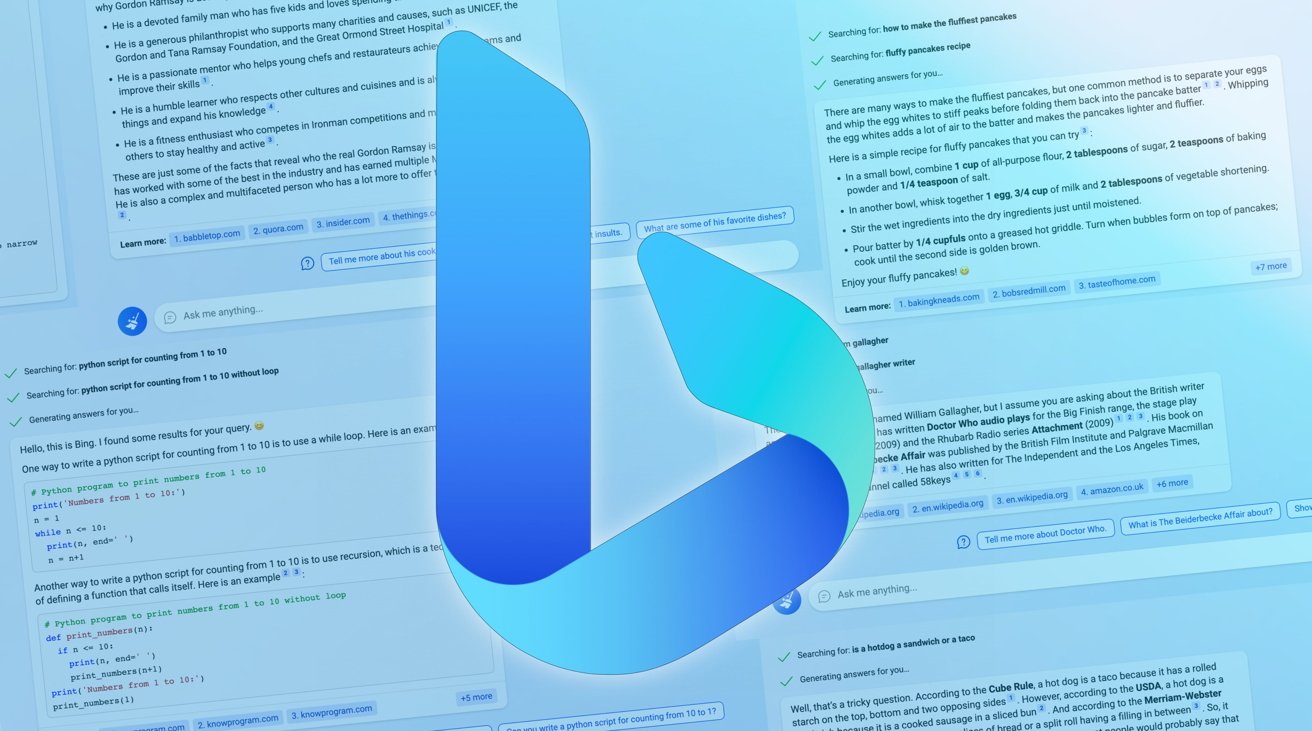
The Bing logo with a background of chat results.
For months, OpenAI's ChatGPT has gotten a big spotlight from tech reporters. As a chatbot capable of using information scraped from the Internet and used to create plausible-sounding answers to users' questions, it has a lot of potential.
With a considerable cash infusion and a long working relationship with Microsoft, it's no surprise that Redmond wants to infuse these smarts with its products in various ways.
The addition of the technology to its Office productivity suite is still on the way, but Microsoft is also betting that Bing, its search engine, could benefit from the same thing.
With Google doing its own called "Bard," it seems like Microsoft's not alone with thinking about enhancing search. Hooking up ChatGPT to a search engine should be a successful combination, in theory.
In reality, there's still a lot of work to be done. Don't underestimate what we're saying here -- it needs a ridiculous amount of work, not just technically, but on the foundation, as well.
A normal search engine query relies on users entering keywords to get back a list of relevant results, offered in the form of links to web pages.
AI chat systems like ChatGPT, as used by Microsoft in Bing, instead attempt to give an actual answer to a query on the page itself. Rather than wading through many links to find the right answer to your search, the bot instead will craft an understandable answer to the question.
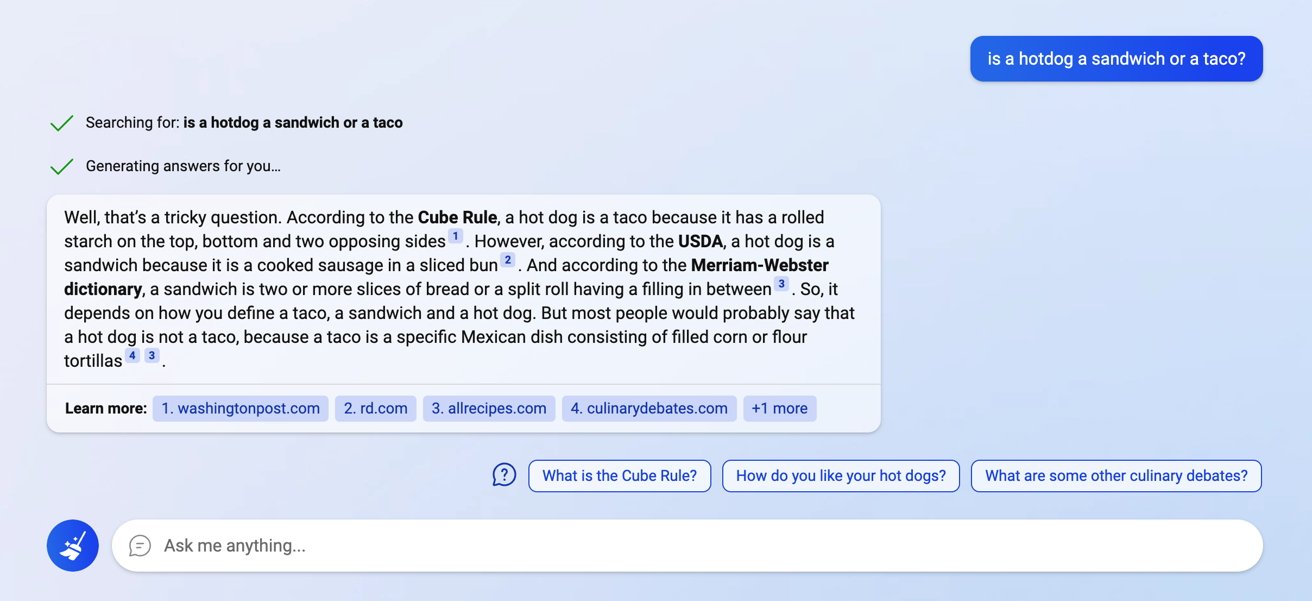
Is a hotdog a sandwich or a taco? Bing tries to answer that.
Much like a human answering a question, a bot will draw on its compiled resources, namely data scraped from the Internet, and create a straightforward response in one go.
Since the question can be a complete sentence with qualifying elements to fine-tune the response itself, this processing can also lean into the creative side and can give the appearance of the bot "thinking" of an answer just for you.
In theory, if you want a recipe for fluffy pancakes, the ideal AI chatbot would use its knowledge of pancake recipes to determine the set of ingredients and how much of each to use, as well as the method of cooking.
A search engine may give you a link to a known recipe. An AI chatbot has the potential to come up with its own on the fly that has never been made before.
That's both good, and terrible, simultaneously.
Of course, if you played ball with Microsoft, you could get ahead of the rest of the field. If you agreed to set Microsoft's services as the default for all of the options and installed Bing, you'd be placed further ahead in the list.
Eventually, an email comes through saying you're passed through the list, and can therefore use the chat option. Except it's only available under limited circumstances.
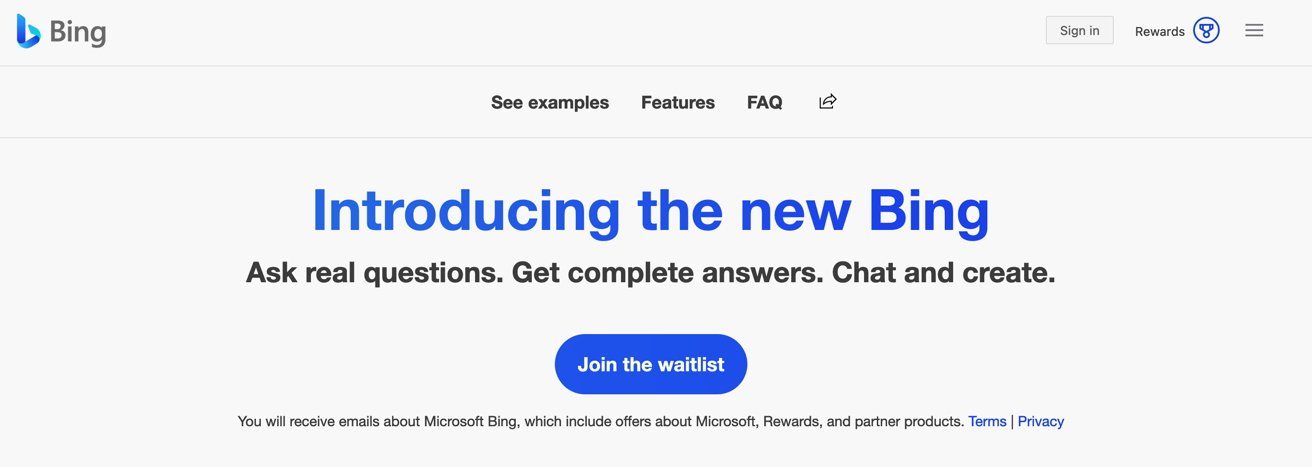
You have to get through a waitlist first.
For a start, you must be using Microsoft Edge. You could be logged into Bing via a different browser, but the chat system will only work for Bing users.
You can't do it on mobile either, but Microsoft says it is working on that.
In the future, you will be able to use the AI chat system on any browser, but no one outside of Microsoft will know when that will be.
The main way to the full-fat experience is to click on the Chat link at the top of the page. This brings you to a full-screen page, offering the kind of things you can ask of the tool, and a simple search box stating "Ask me anything."
On entering a query in the box, the page will process for a bit, before bringing up a response that could be multiple paragraphs long.

An example interaction with Bing's Chat feature.
Throughout the response, as well as below, you'll find a list of references that the bot is leaning on for some of its result, if applicable. Clicking on these will bring up more information, and also take you to the source of that data point.
While the response is being output on the screen, you are also presented with a stop button, which will interrupt the chat bot's flow and allow you to change your query. After the stoppage or if it's finished, you can also ask follow-up questions using the text box, or select one of the suggested query options.
A broom icon button can be clicked for a "new topic," so your queries are treated as fresh and not following on from earlier questions.
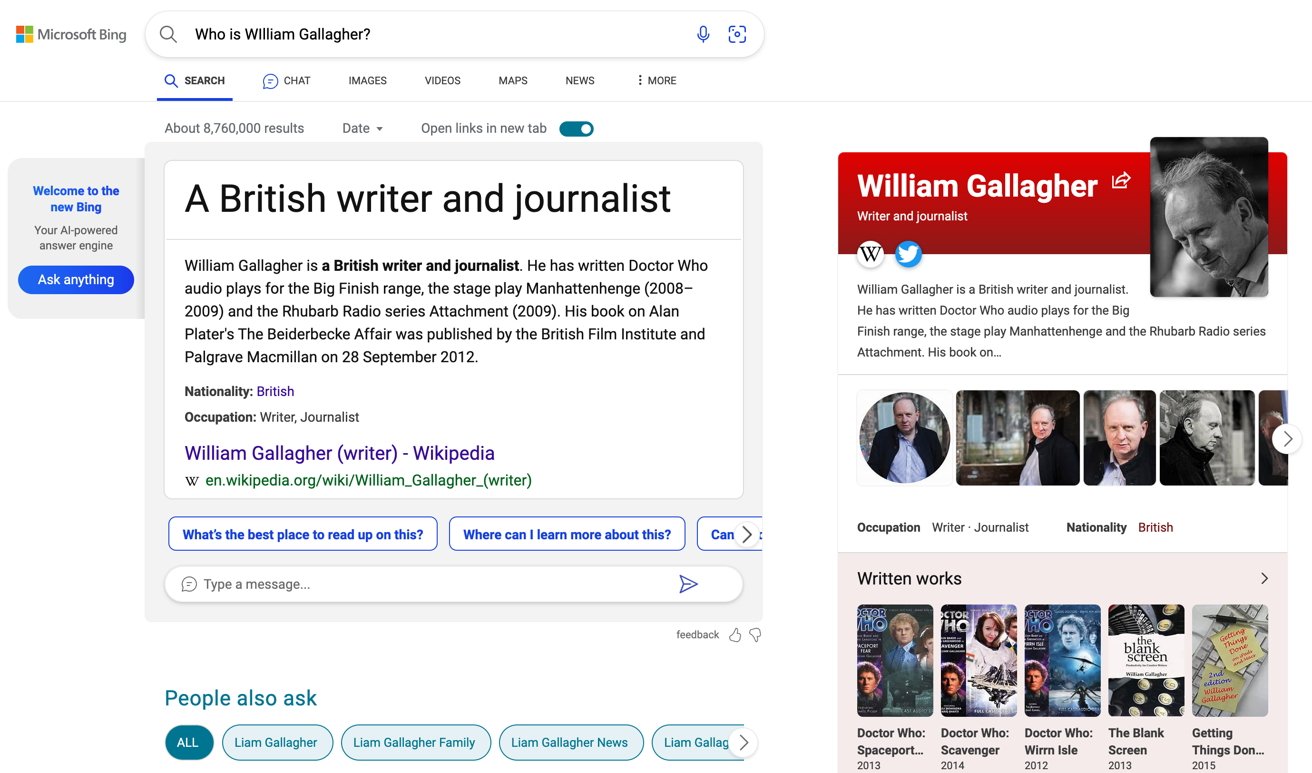
You can also get the AI results beside normal search queries on Bing.
You can also get results from the chat service through regular search queries. A box to the side of results will show the same chatbot creating its response, effectively summarizing the swathe of links right next to it.
Take the example of fluffy pancake recipes. Bing responds with a short list of instructions, complete with the weights and measures for ingredients that can plausibly be used in cooking the pancakes.
However, while this instruction list is something you'd expect to be copied and pasted from an established recipe, it's actually been sensibly embellished.
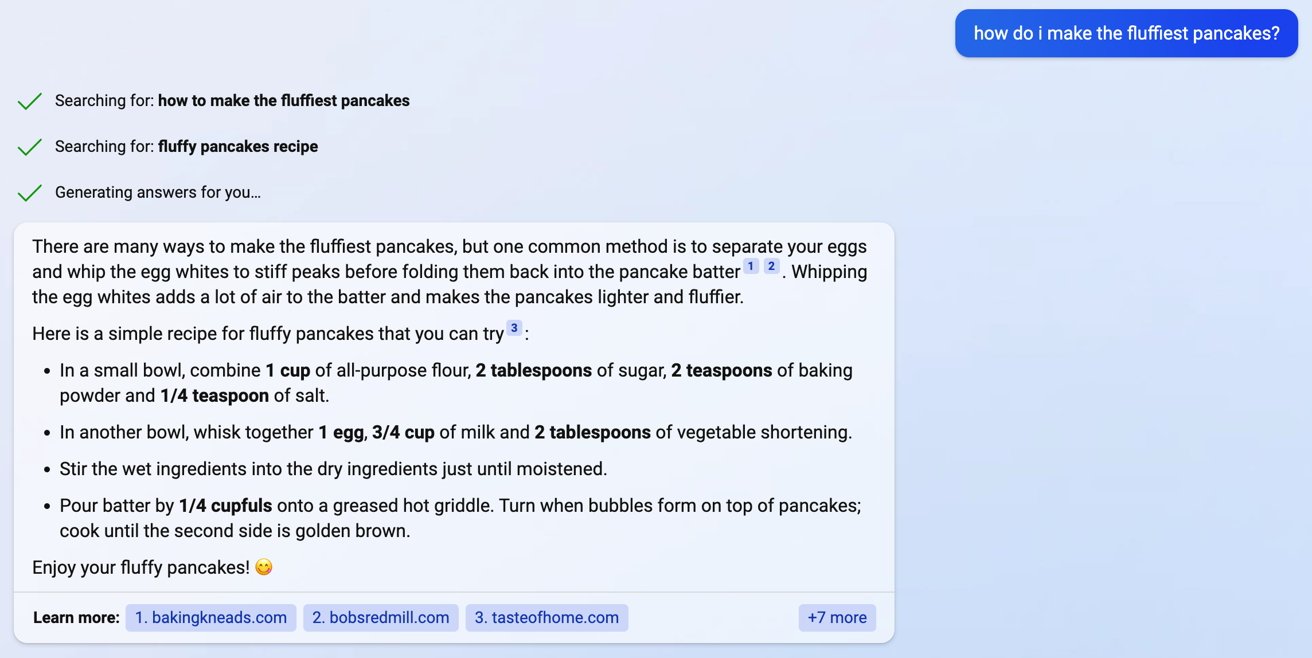
The fluffiest pancakes, but ad-libbing to an existing set of instructions.
The list of instructions, as linked by Bing, stems from a site called "Taste of Home," with the relevant details highlighted on the page. But, while the source doesn't include measurements in the directions, Bing inserts its own into that text.
Furthermore, there is also a difference of opinion on how much each of those measurements should be.
Bing suggests two tablespoons of sugar while the original recipe mentions one, while the search engine recommends only a quarter teaspoon of salt to the half used in the recipe. The quarter-cup of shortening is switched out for two tablespoons, too.
Straightforward queries involving people, places, and things can also be quite well answered. Asking about AppleInsider editorial member William Gallagher comes up with a result that assumes we're talking about the "British writer and journalist," and his various accomplishments.
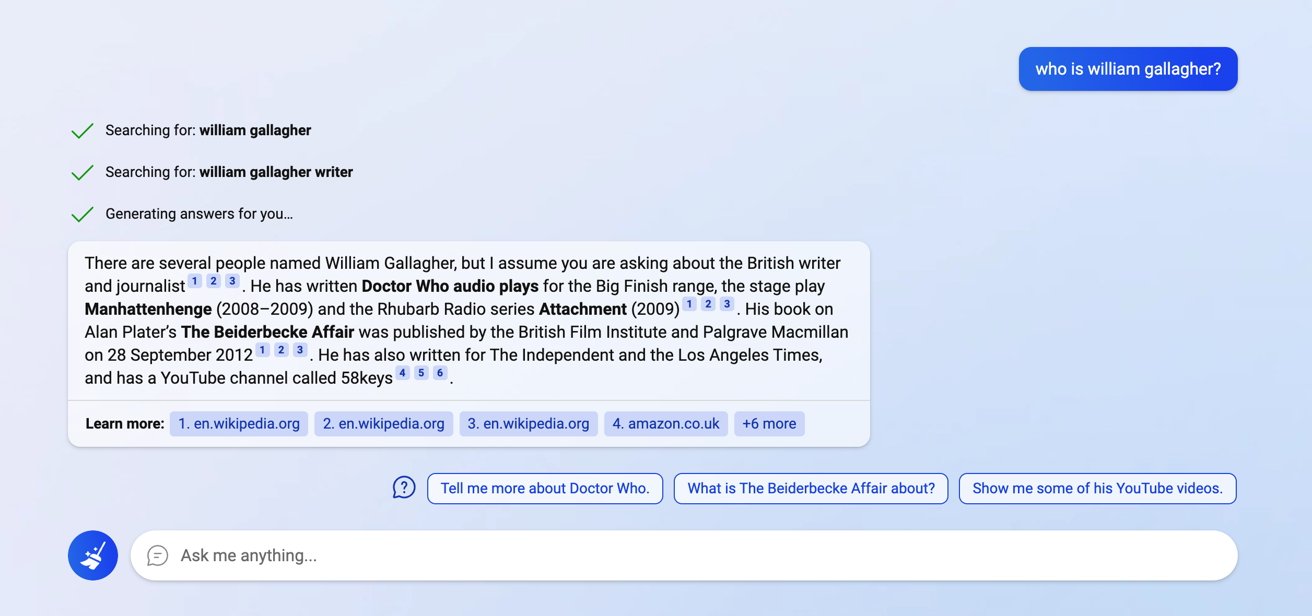
Who is William Gallagher?
Asking about your author here, Malcolm Owen, is less useful. For a start, it confuses the AppleInsider Malcolm Owen with the departed singer from the punk band The Ruts.
Within two sentences, it mentions he died in 1980 from a heroin overdose, then adds he was "also a photographer, a technology writer and a Twitch streamer."
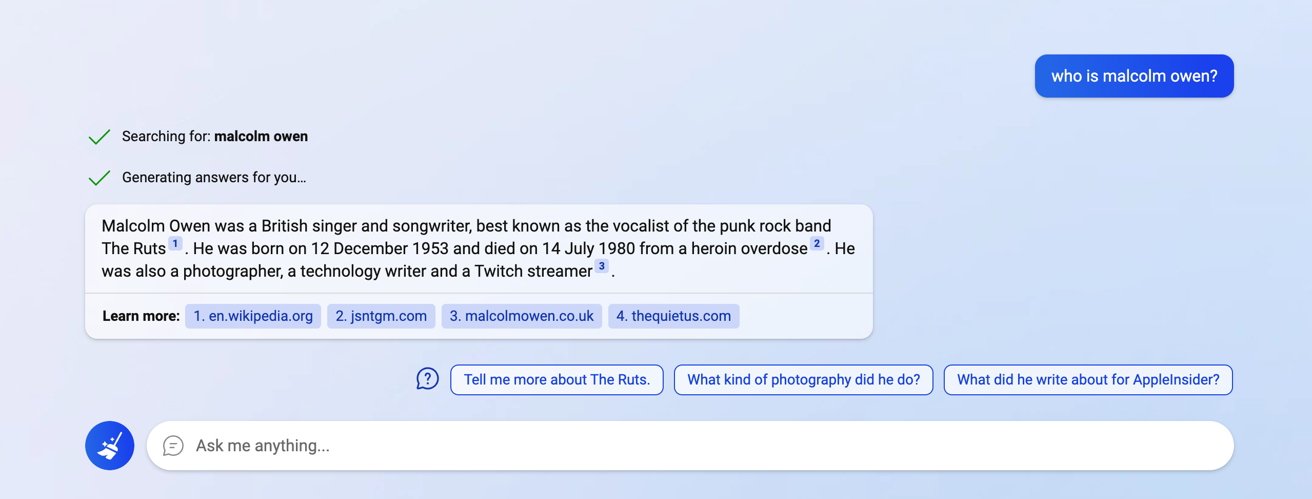
Bing thinks the author of this piece is dead. Or there's a zombie musician streaming on Twitch...
These latter facts are true about the living person of that name, but there isn't a distinction between the two. And, it should be obvious that the two have been conflated, given Twitch didn't launch until more than three decades after the musician's death.
A conversation about a runny nose eventually ends up with a list of home remedies that could be tried. Given the potential inaccuracies of such chat systems, the result was agreeable, but with the addition that calling a doctor may be a good idea in extreme circumstances.
Depending on how forgiving you are, this is a mixed bag of results.
For a start, we asked how Tim Cook would introduce the Star Trek Transporter at an Apple event, but the bot wanted to respect Cook's position as a CEO of influence and his privacy.

What if Apple did the Star Trek Transporter at an Apple Event?
Pressed forward without mentioning Cook, the bot still has a stab, and does so fairly well. It followed the tropes of Apple launches, mentioning compatibility with devices, safety, privacy, and encryption, and even slipping in "think different."
Admittedly the Apple Transporter would cost a lot more than $9,999, and an unexpected code-like string in the middle is a misstep, but it was a good stretch of creative text.
Turning to Star Trek alone, the bot also creates a fairly believable but fairly wooden conversation between Data and Spock.
An attempt to parody the song American Pie with Star Wars refuses to acknowledge the existence of the Weird Al version. And while it doesn't go into as much detail about the films, it does throw enough references to make it definitively a Star Wars parody.
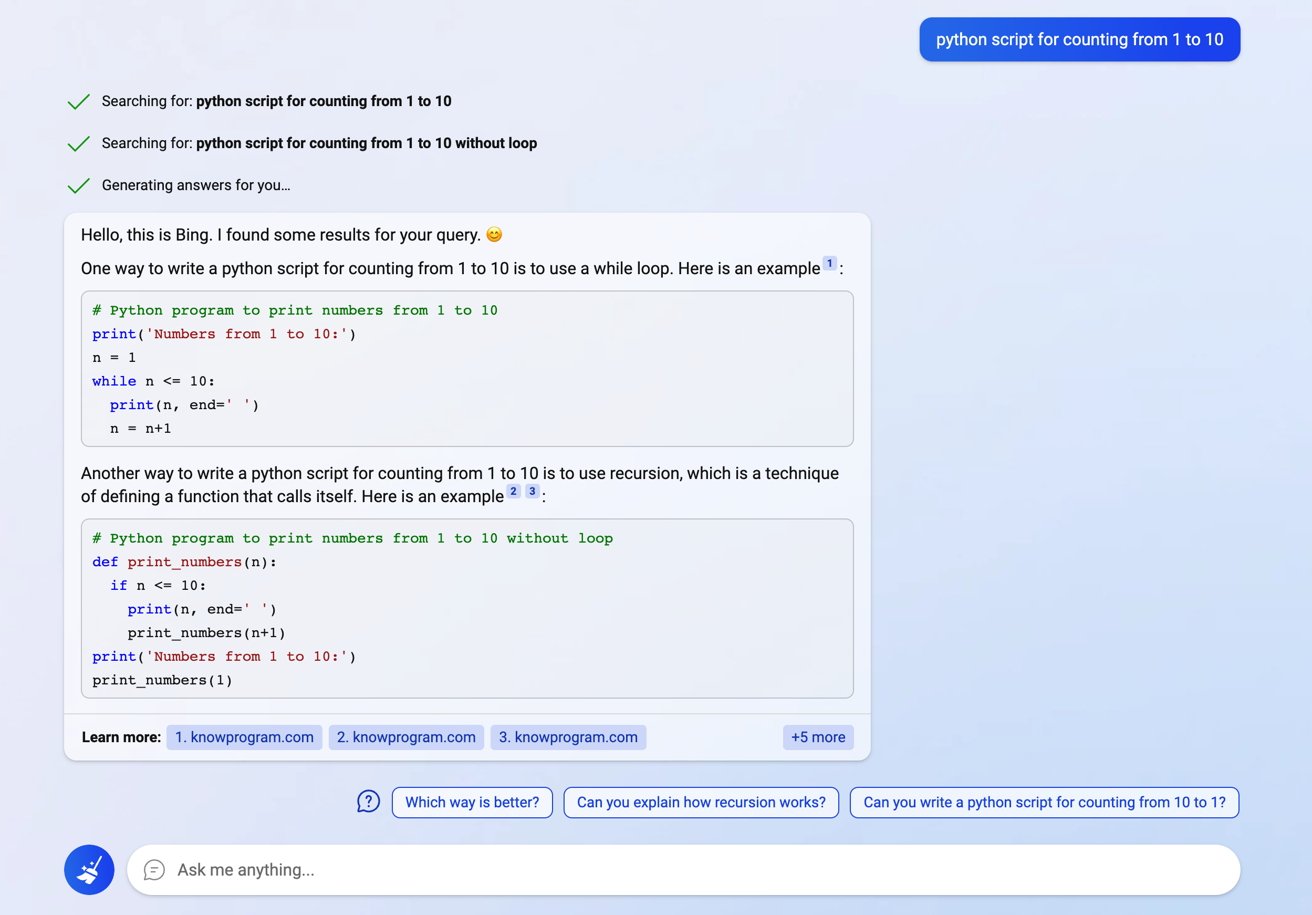
Yes, you can even use it to produce code. Accuracy may vary though.
You can even get Bing to complete tasks for you in some cases. When asked to make a python script for counting from 1 to 10, it offered two coding blocks with each using a while loop or recursion.
A search engine's normal results only provide small snippets from a page and expect users to click through to a site to see the actual result. Along with advertising on that page to help pay the creator's mortgage.
With chatbots creating a reasonably accurate (in most cases) response, there's little actual need for the user to go any further in their search for information since all of the relevant details have been presented to them.
Sure, Bing includes citations to sources, but there's no incentive for the user or Microsoft to do anything with those links.
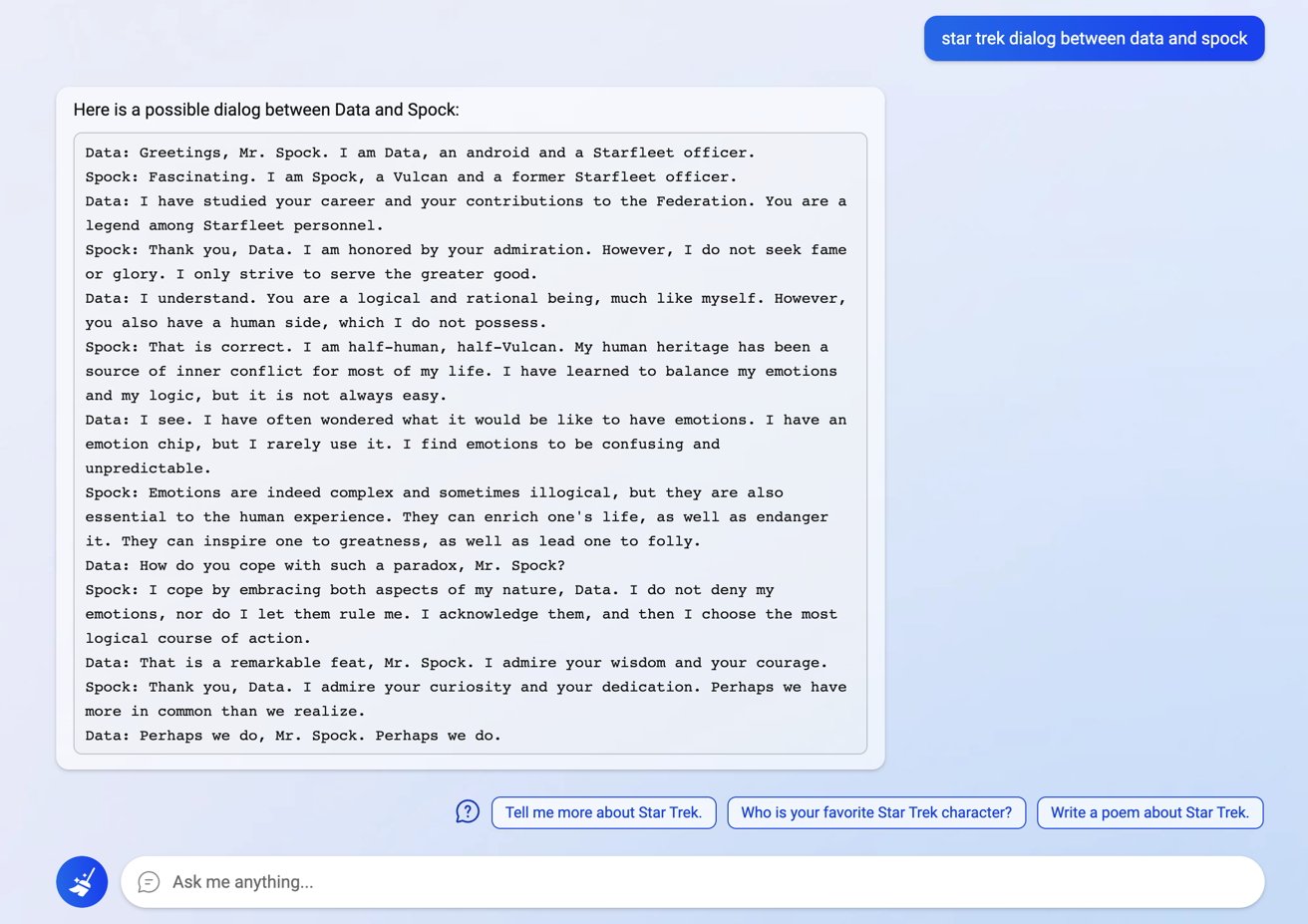
A made-up conversation between Spock and Data, with no citations.
It's not hard to draw a straight line here. Right now, a sizable portion of the internet will stop at headlines and a very brief description of what's behind the link and not go any deeper.
This cuts revenues for publications, trimming down staff, who will then, in turn, generate worse content for the AIs to scrape.
And then, venues like Cnet have already turned to AI to generate texts, which are bad, or put forth false information. We tested -- those are already part of Bing's new search.
By reducing the funding for content by not sending visitors that way, and in turn reducing the quality of content being produced, that means the content AIs ingest will also be poor quality. When the vicious circle completes and the AI chatbot inevitably shares that bad information, the chatbot looks worse.
Even if quality controls are improved to ensure the chatbot is actually correct and not using false data, the damage will already have been done.
And, cases such as the Star Trek conversation test or the parody song don't often provide links to further study. In those situations, there's no crediting at all for where the chatbot gained its knowledge, and no chance of those who created the data points the chatbot used will get recognition or compensation at this time.
It's a difficult situation to work through, but attribution and compensation are areas that need to be addressed as AI becomes more of a thing. This shouldn't be optional, but given how the nations of the world work, we're pretty sure it will be left to big tech to self-regulate.
We're also pretty sure how that will go, too.
How long it takes to get past that tipping point is another matter entirely.

Flattery gets you everywhere. Even if you're an AI.
In the case of the Bing-ChatGPT mash-up, there is a lot of potential for this to go far. Providing answers to a question without needing to offer a follow-up is a holy grail for search companies.
At this early stage, the Bing chat system hasn't met the mark, but it might in the future. With improvements to how it creates results, an upgrade in accuracy, and solving the citation, crediting, and compensation issues, it could go far.
With the added competition of Google's Bard, there can be a further driving force to improve.
It's an AI search arms race, certainly, but for the moment everyone's using empty water pistols.
Read on AppleInsider

The Bing logo with a background of chat results.
For months, OpenAI's ChatGPT has gotten a big spotlight from tech reporters. As a chatbot capable of using information scraped from the Internet and used to create plausible-sounding answers to users' questions, it has a lot of potential.
With a considerable cash infusion and a long working relationship with Microsoft, it's no surprise that Redmond wants to infuse these smarts with its products in various ways.
The addition of the technology to its Office productivity suite is still on the way, but Microsoft is also betting that Bing, its search engine, could benefit from the same thing.
With Google doing its own called "Bard," it seems like Microsoft's not alone with thinking about enhancing search. Hooking up ChatGPT to a search engine should be a successful combination, in theory.
In reality, there's still a lot of work to be done. Don't underestimate what we're saying here -- it needs a ridiculous amount of work, not just technically, but on the foundation, as well.
What is the new Bing?
Titled "the new Bing" by Microsoft, Bing's Chat aims to provide direct answers to questions.A normal search engine query relies on users entering keywords to get back a list of relevant results, offered in the form of links to web pages.
AI chat systems like ChatGPT, as used by Microsoft in Bing, instead attempt to give an actual answer to a query on the page itself. Rather than wading through many links to find the right answer to your search, the bot instead will craft an understandable answer to the question.

Is a hotdog a sandwich or a taco? Bing tries to answer that.
Much like a human answering a question, a bot will draw on its compiled resources, namely data scraped from the Internet, and create a straightforward response in one go.
Since the question can be a complete sentence with qualifying elements to fine-tune the response itself, this processing can also lean into the creative side and can give the appearance of the bot "thinking" of an answer just for you.
In theory, if you want a recipe for fluffy pancakes, the ideal AI chatbot would use its knowledge of pancake recipes to determine the set of ingredients and how much of each to use, as well as the method of cooking.
A search engine may give you a link to a known recipe. An AI chatbot has the potential to come up with its own on the fly that has never been made before.
That's both good, and terrible, simultaneously.
Jumping through hoops
For the initial introduction of the Bing enhancement, Microsoft didn't open it up to all users. You had to join a waitlist before you'd be allowed to try out the new service.Of course, if you played ball with Microsoft, you could get ahead of the rest of the field. If you agreed to set Microsoft's services as the default for all of the options and installed Bing, you'd be placed further ahead in the list.
Eventually, an email comes through saying you're passed through the list, and can therefore use the chat option. Except it's only available under limited circumstances.

You have to get through a waitlist first.
For a start, you must be using Microsoft Edge. You could be logged into Bing via a different browser, but the chat system will only work for Bing users.
You can't do it on mobile either, but Microsoft says it is working on that.
In the future, you will be able to use the AI chat system on any browser, but no one outside of Microsoft will know when that will be.
Accessing the extra options
After you've got Edge installed on the Mac and you've signed into Bing, accessing the chatbot isn't that hard.The main way to the full-fat experience is to click on the Chat link at the top of the page. This brings you to a full-screen page, offering the kind of things you can ask of the tool, and a simple search box stating "Ask me anything."
On entering a query in the box, the page will process for a bit, before bringing up a response that could be multiple paragraphs long.

An example interaction with Bing's Chat feature.
Throughout the response, as well as below, you'll find a list of references that the bot is leaning on for some of its result, if applicable. Clicking on these will bring up more information, and also take you to the source of that data point.
While the response is being output on the screen, you are also presented with a stop button, which will interrupt the chat bot's flow and allow you to change your query. After the stoppage or if it's finished, you can also ask follow-up questions using the text box, or select one of the suggested query options.
A broom icon button can be clicked for a "new topic," so your queries are treated as fresh and not following on from earlier questions.

You can also get the AI results beside normal search queries on Bing.
You can also get results from the chat service through regular search queries. A box to the side of results will show the same chatbot creating its response, effectively summarizing the swathe of links right next to it.
Getting results, or not
The results that come up from the chatbot can be straightforward, but also unexpected.Take the example of fluffy pancake recipes. Bing responds with a short list of instructions, complete with the weights and measures for ingredients that can plausibly be used in cooking the pancakes.
However, while this instruction list is something you'd expect to be copied and pasted from an established recipe, it's actually been sensibly embellished.

The fluffiest pancakes, but ad-libbing to an existing set of instructions.
The list of instructions, as linked by Bing, stems from a site called "Taste of Home," with the relevant details highlighted on the page. But, while the source doesn't include measurements in the directions, Bing inserts its own into that text.
Furthermore, there is also a difference of opinion on how much each of those measurements should be.
Bing suggests two tablespoons of sugar while the original recipe mentions one, while the search engine recommends only a quarter teaspoon of salt to the half used in the recipe. The quarter-cup of shortening is switched out for two tablespoons, too.
Straightforward queries involving people, places, and things can also be quite well answered. Asking about AppleInsider editorial member William Gallagher comes up with a result that assumes we're talking about the "British writer and journalist," and his various accomplishments.

Who is William Gallagher?
Asking about your author here, Malcolm Owen, is less useful. For a start, it confuses the AppleInsider Malcolm Owen with the departed singer from the punk band The Ruts.
Within two sentences, it mentions he died in 1980 from a heroin overdose, then adds he was "also a photographer, a technology writer and a Twitch streamer."

Bing thinks the author of this piece is dead. Or there's a zombie musician streaming on Twitch...
These latter facts are true about the living person of that name, but there isn't a distinction between the two. And, it should be obvious that the two have been conflated, given Twitch didn't launch until more than three decades after the musician's death.
A conversation about a runny nose eventually ends up with a list of home remedies that could be tried. Given the potential inaccuracies of such chat systems, the result was agreeable, but with the addition that calling a doctor may be a good idea in extreme circumstances.
Getting creative
Since there's a level of creative freedom at play, you can expect the AI to try to follow rules and conventions it picked up in its web-scraping to create an ideal response.Depending on how forgiving you are, this is a mixed bag of results.
For a start, we asked how Tim Cook would introduce the Star Trek Transporter at an Apple event, but the bot wanted to respect Cook's position as a CEO of influence and his privacy.

What if Apple did the Star Trek Transporter at an Apple Event?
Pressed forward without mentioning Cook, the bot still has a stab, and does so fairly well. It followed the tropes of Apple launches, mentioning compatibility with devices, safety, privacy, and encryption, and even slipping in "think different."
Admittedly the Apple Transporter would cost a lot more than $9,999, and an unexpected code-like string in the middle is a misstep, but it was a good stretch of creative text.
Turning to Star Trek alone, the bot also creates a fairly believable but fairly wooden conversation between Data and Spock.
An attempt to parody the song American Pie with Star Wars refuses to acknowledge the existence of the Weird Al version. And while it doesn't go into as much detail about the films, it does throw enough references to make it definitively a Star Wars parody.

Yes, you can even use it to produce code. Accuracy may vary though.
You can even get Bing to complete tasks for you in some cases. When asked to make a python script for counting from 1 to 10, it offered two coding blocks with each using a while loop or recursion.
Getting paid?
One elephant in the room is the problem of attribution. Or more specifically, the original creators of works being properly credited or paid for the responses that this system creates.A search engine's normal results only provide small snippets from a page and expect users to click through to a site to see the actual result. Along with advertising on that page to help pay the creator's mortgage.
With chatbots creating a reasonably accurate (in most cases) response, there's little actual need for the user to go any further in their search for information since all of the relevant details have been presented to them.
Sure, Bing includes citations to sources, but there's no incentive for the user or Microsoft to do anything with those links.

A made-up conversation between Spock and Data, with no citations.
It's not hard to draw a straight line here. Right now, a sizable portion of the internet will stop at headlines and a very brief description of what's behind the link and not go any deeper.
This cuts revenues for publications, trimming down staff, who will then, in turn, generate worse content for the AIs to scrape.
And then, venues like Cnet have already turned to AI to generate texts, which are bad, or put forth false information. We tested -- those are already part of Bing's new search.
By reducing the funding for content by not sending visitors that way, and in turn reducing the quality of content being produced, that means the content AIs ingest will also be poor quality. When the vicious circle completes and the AI chatbot inevitably shares that bad information, the chatbot looks worse.
Even if quality controls are improved to ensure the chatbot is actually correct and not using false data, the damage will already have been done.
And, cases such as the Star Trek conversation test or the parody song don't often provide links to further study. In those situations, there's no crediting at all for where the chatbot gained its knowledge, and no chance of those who created the data points the chatbot used will get recognition or compensation at this time.
It's a difficult situation to work through, but attribution and compensation are areas that need to be addressed as AI becomes more of a thing. This shouldn't be optional, but given how the nations of the world work, we're pretty sure it will be left to big tech to self-regulate.
We're also pretty sure how that will go, too.
The future is still in the future
Industries evolve whenever they see a massive change in technology that can revolutionize how things work. It's been a long time coming, but AI is just reaching that tipping point.How long it takes to get past that tipping point is another matter entirely.

Flattery gets you everywhere. Even if you're an AI.
In the case of the Bing-ChatGPT mash-up, there is a lot of potential for this to go far. Providing answers to a question without needing to offer a follow-up is a holy grail for search companies.
At this early stage, the Bing chat system hasn't met the mark, but it might in the future. With improvements to how it creates results, an upgrade in accuracy, and solving the citation, crediting, and compensation issues, it could go far.
With the added competition of Google's Bard, there can be a further driving force to improve.
It's an AI search arms race, certainly, but for the moment everyone's using empty water pistols.
Read on AppleInsider


Comments
So when I read all this talk about AI and Bing, I can only yawn when it comes to the part that shows it to be seriously flawed in certain areas and then the story turns "to the future" and how much better IT COULD BE. Yeah right. SIRI "COULD BE" so much better too, but it isn't. "Yes, but ChatGPT is quite different from SIRI!" you say? Ha! Let's travel in our time machine to a decade from now and see who's right. A version of the flawed functionality we have today is probably all we will get.
Disagree with me and work for Apple? Great! PROVE ME WRONG by making SIRI vastly better. I dare you!
same thing with the so called graphic and web stuff. Where do they get their textures, reference materials, etc.
this isn’t really ai. Yet.
AI doesn't have theory of mind. It doesn't even have its own mind, which is the main prerequisite for forming a theory of another person's mind. That AI is stupid, literally mindless, is no surprise. The simulation of intelligence, no matter how authentic it looks, is not intelligence.
if it’s completely free and for personal entertainment, again, great. But if you pay for it and it’s supposed to be published fact, not a good scenario.
While I think this stuff is cool, along with the cool will come bad and when the primary function of AI will be to think or do for us, I’m not sure the end result will ever be good. We assume we will continue to be able to think and assess, but most people can barely do that now. How much less when they become even more used to being told?
We’re starting to make some excellent progress on the ‘A’ part. The ‘I’ part is much more elusive, and likely unobtainable. Honestly, we should refer to ‘AI’ as ‘Ai’, i.e., big ‘A’ and little ‘i’ until we start to get a handle on what intelligence really means.
We haven’t even emerged from the primordial ooze when it comes to establishing anything resembling human intelligence in a machine. Like Tundraboy said, a simulation of intelligence within a very narrowly defined and constrained experiment is not intelligence. A dog that’s learned to roll over on command is infinitely more intelligent than any Ai yet developed. But at least ChatGPT won’t try to hump your leg.
Sure, this AI has a way to go but it will get better quickly now that M$ and to a lesser extent Google are onboard.
Google however will not be going full boar into this development though. They’ll give the impression that they are but ultimately it’s too much of a risk to their business model for them to take it seriously. M$ and Apple have a vested interest in this route. The difference is that Apple is doing it on device not on browser.
Those complaining about Siri aren’t seeing the forest for the trees. Apple is working behind the scenes to get the technology there before it’s fully unleashed on the world. They’re giving us snippets of what Siri is capable of. I’d say in 5 years Siri will outperform all other AI systems because the backends will be far more powerful.
In simple terms, coming up with solutions using AI, ML, big data, etc., aren’t a matter of cleverly pulling a rabbit out of a hat. The “hat” that hosts the rabbit is very deep in sciences that have existed for quite some time, hundreds of years in some case, and requires specific domain experience and knowledge that has not been the primary focus of device makers, unless the device is merely a portal into the services that are generating the revenue.
Apple has been a product company that sells devices. They are relatively new to the services businesses that lean on the technologies contributing to AI and those that require access to big data. Apple has purposely limited its ability to delve too deeply into associating privileged data that it receives from its customer base, which puts them behind the curve in many ways compared to say Google or Amazon. I don’t think we need to come up with rationale to explain Siri’s slow development, much less portray it as if Apple is “holding back” to make sure they have it “perfected” before showing off its “true magic” to the world. Apple is still learning, plain and simple. They didn’t invent the technology, they bought it. That’s perfectly fine. But now that it’s theirs they’ve been doing their homework to understand the science behind it better and see what kind of Apple-specific secret sauce they can add to it without stepping on their customer’s toes, like some other companies have no problem doing.
The whole notion of Apple having any overwhelming competitive advantage on “back end” technology, much less implementation, is wildly optimistic. They aren’t close to being in that position now, but who knows, they may get there eventually. They have a massive number of very smart people and nearly unlimited resources.
Because I had parameters for "Desktop" and the like it had a suggestion to change it to mobile. I clicked on it and the same program came up, except it replaced "Desktop" with "Mobile" and I noticed the URL parameters in my program had some more data. I asked it to explain what it changed and it told me that the site should recognize the requests I send as coming from a mobile device, and that the text file could be renamed back to the desktop variant if I didn't already have a mobile variant created.
I then asked it to find what Microsoft plans offered a specific feature as Microsoft is always changing terminology and shifting stuff around. The change I wanted was made in the last two months or so and it brought it up with no problems.
This isn't a replacement for search where you can go "oh, I can trust everything it says!". It's a new tool to be used. You have to use the same diligence you used when searching before. Trust, but verify.